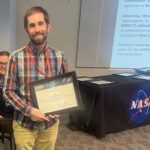A new paper co-authored by ESSIC Director / AOSC Chair Fernando Miralles-Wilhelm has been highlighted in the Featured Research section in PLOS’s “Crops, Food Security & Food Systems” channel. The paper, titled “The Paris pledges and the energy-water-land nexus in Latin America: Exploring implications of greenhouse gas emission reductions,” discusses the 2015 Paris pledges made by nations worldwide to avert the threat of climate change.
The pledges, known as “Nationally Determined Contributions” (NDCs), are often analyzed in terms of their implied contribution in limiting global warming, their implications on the energy sector or on mitigation costs. This analysis often overlooks the impact of NDCs on the “Energy-Water-Land nexus” resource system.
Focusing on Brazil, Mexico, Argentina, and Colombia, the authors stress the potential consequences that emissions reduction strategies may have on national water demands. They investigate if nations could shift their agricultural systems towards reduced irrigation needs as water resources become more difficult and costly.
A hydrologist and water resources engineer, Miralles-Wilhelm conducts research on water, sustainability and climate. He has worked on problems related to surface water and groundwater; physical, chemical and biological processes in aquatic ecosystems; climate-hydrology-vegetation interactions in ecosystems; water resources management in urban and agricultural watersheds; stormwater management; and water quality control.
Co-authors include Atmospheric and Oceanic Sciences Graduate student and Miralles-Wilhelm advisee Silvia R. Santos Da Silva, and scientists from the Inter-American Development Bank and Joint Global Change Research Institute.
To read the paper, click here: “The Paris pledges and the energy-water-land nexus in Latin America: Exploring implications of greenhouse gas emission reductions”.





